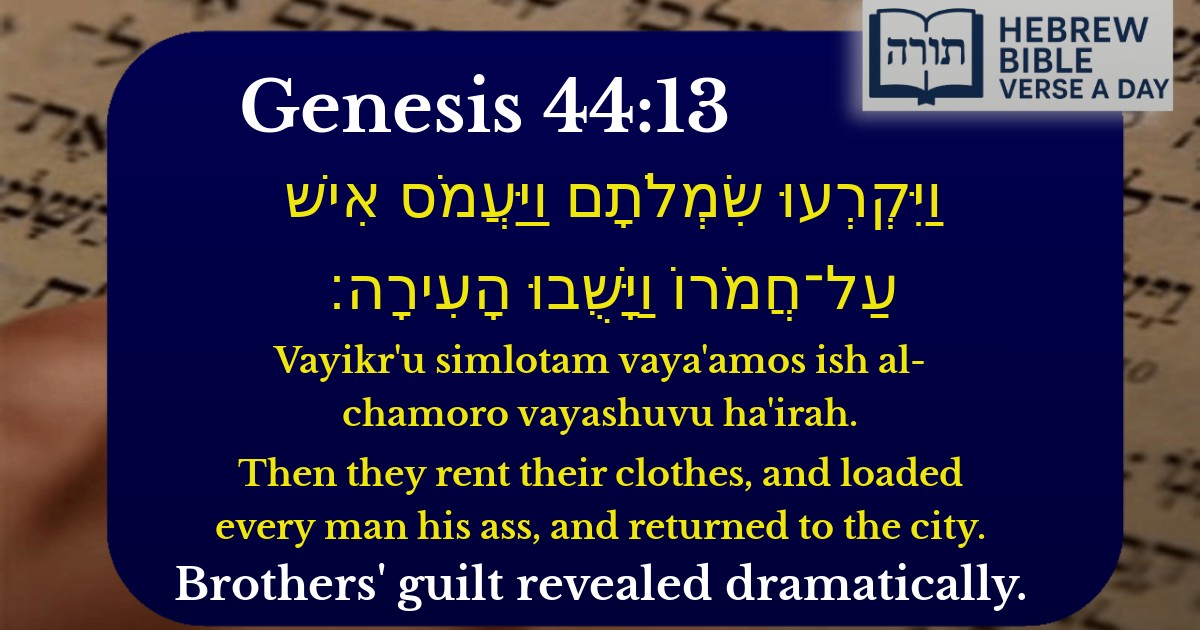Join Our Newsletter To Be Informed When New Videos Are Posted
Join the thousands of fellow Studends who rely on our videos to learn how to read the bible in Hebrew for free!
Hebrew Text
וַיִּקְרְעוּ שִׂמְלֹתָם וַיַּעֲמֹס אִישׁ עַל־חֲמֹרוֹ וַיָּשֻׁבוּ הָעִירָה׃
English Translation
Then they rent their clothes, and loaded every man his ass, and returned to the city.
Transliteration
Vayikr'u simlotam vaya'amos ish al-chamoro vayashuvu ha'irah.
Hebrew Leining Text
וַֽיִּקְרְע֖וּ שִׂמְלֹתָ֑ם וַֽיַּעֲמֹס֙ אִ֣ישׁ עַל־חֲמֹר֔וֹ וַיָּשֻׁ֖בוּ הָעִֽירָה׃
וַֽיִּקְרְע֖וּ שִׂמְלֹתָ֑ם וַֽיַּעֲמֹס֙ אִ֣ישׁ עַל־חֲמֹר֔וֹ וַיָּשֻׁ֖בוּ הָעִֽירָה׃
🎵 Listen to leining
Parasha Commentary
📚 Talmud Citations
This verse is not quoted in the Talmud.


Context of the Verse
This verse appears in Bereshit (Genesis) 44:13, describing the reaction of Yosef's brothers after the goblet was found in Binyamin's sack. The brothers, realizing the gravity of the situation, tore their garments and returned to the city where Yosef (still unrecognized by them) resided.
Explanation of "וַיִּקְרְעוּ שִׂמְלֹתָם" (They Rented Their Clothes)
Rashi explains that tearing one's garments is a sign of mourning and distress, a common practice in biblical times upon hearing tragic news (see also Bereishit 37:34, where Yaakov tears his clothes upon seeing Yosef’s bloodstained coat). The Talmud (Moed Katan 26a) discusses the laws of kriah (rending garments) as an expression of grief. Here, the brothers demonstrate their anguish over Binyamin’s apparent guilt and the potential consequences.
Meaning of "וַיַּעֲמֹס אִישׁ עַל־חֲמֹרוֹ" (Loaded Every Man His Donkey)
Ramban (Nachmanides) notes that the brothers did not abandon their belongings but took them back to the city, indicating they did not flee in panic. The Midrash (Bereishit Rabbah 92:8) suggests this reflects their resolve to face the situation rather than escape responsibility. The donkey, often a beast of burden, symbolizes their readiness to bear the weight of their predicament.
Significance of "וַיָּשֻׁבוּ הָעִירָה" (Returned to the City)
Malbim explains that their return to the city—despite the danger—shows their commitment to resolving the matter with the Egyptian ruler (Yosef). The Sforno adds that this act demonstrated their unity and loyalty to Binyamin, fulfilling their promise to Yaakov to protect him. This moment marks a turning point in their teshuvah (repentance) for their earlier mistreatment of Yosef.
Broader Themes